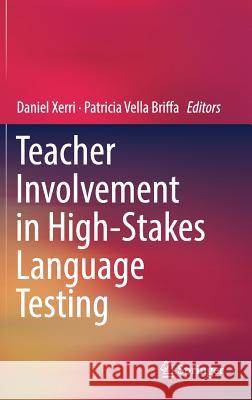Teacher Involvement in High-Stakes Language Testing » książka



Teacher Involvement in High-Stakes Language Testing
ISBN-13: 9783319771755 / Angielski / Twarda / 2018 / 345 str.
Teacher Involvement in High-Stakes Language Testing
ISBN-13: 9783319771755 / Angielski / Twarda / 2018 / 345 str.
(netto: 535,46 VAT: 5%)
Najniższa cena z 30 dni: 539,74
ok. 16-18 dni roboczych.
Darmowa dostawa!
This book advocates that teachers should play an active role in high-stakes language testing and that more weight should be given to teacher judgement.
1. Introduction; Daniel Xerri and Patricia Vella Briffa.- PART 1: Benefits and Challenges of Teacher Involvement in High-stakes Language Testing.- 2. The Role of Classroom Teachers in Standard Setting and Benchmarking; Eva Konrad, Carol Spöttl, Franz Holzknecht and Benjamin Kremmel.- 3. A Critical Analysis of Teacher Involvement in the English Language Paper of the First School Leaving Certificate Examination (FSLC) in Cameroon; Achu Charles Tante.- 4. Potentials and Challenges of Teacher Involvement in Rating Scale Design for High-stakes Exams; Franz Holzknecht, Benjamin Kremmel, Carmen Konzett, Kathrin Eberharter and Carol Spöttl.- 5. Am I Just Stupid? Key Issues for Teachers Involved in High-stakes Testing with Children who have Dyslexia; David Armstrong.- PART 2: Assessment Literacy for/through Teacher Involvement in High-stakes Language Testing.- 6. Are Teachers Given Sufficient Tools as Examiners in the New Foreign Language Speaking Component of the French Baccalauréat?; gemma Bellhouse.- 7. Assessment Literacy for Teachers: A Pilot Study Investigating the Challenges, Benefits and Impact of Assessment Literacy Training; Elaine Boyd and David Donnarumma.- 8. Teachers as Testers: The Case of EOI Teachers in Galicia, Spain; Cristina Rodriguez.- 9. Teachers Setting the Assessment (Literacy) Agenda: A Case Study of a Teacher-Led National Test Development Project in Luxembourg; Tineke Brunfaut and Luke Harding.- 10. Fostering Language Assessment Literacy Through Teacher Involvement in High-stakes Test Development; Benjamin Kremmel, Kathrin Eberharter, Franz Holzknecht and Eva Konrad.- PART 3: Perceptions and Beliefs in Relation to Teacher Involvement in High-stakes Language Testing.- 11. Teacher-examiners’ Explicit and Enacted Beliefs about Proficiency Indicators in National Oral Assessments; Christine C. M. Goh and Ang Hui Teng.- 12. Expatriate High School English Teachers’ Experiences with Entrance Examination Creation in Japan: Opportunities and Challenges; Melodie Cook.- 13. English Language Teachers’ Perceptions of Involvement in High-stakes Testing in Turkey; Kenan Dikilitaş, Yeşim Keşli Dollar and Enisa Mede.- 14. Teacher Involvement in the Russian National Exam in Foreign Languages: Experience and Perspectives; Evgeniia Zimina.- 15. Teachers’ Voices in the Decision to Discontinue a Public Examination Reform: Washback Effects and Implications for Utilizing Tests as Levers for Change; Hyunjin Kim and Talia Isaacs.- 16. A Survey of English Language Testing Practices in China: Students’ and Teachers’ Perspectives; Jason Jinsong Fan.- 17. An Experienced EFL Teacher’s Perception of High-stakes English Language Tests and Beliefs about Language Teaching: A Case Study; Yumiko Moore.- 18. Examining Washback in EFL Multi-exam Preparation Classes in Greece: A Focus on Teachers’ Teaching Practices; Irini Papakammenou.- 19. Conclusion; Patricia Vella Briffa and Daniel Xerri.
This book advocates that teachers should play an active role in high-stakes language testing and that more weight should be given to teacher judgement. This is likely to increase the formative potential of high-stakes tests and provide teachers with a sense of ownership. The implication is that the knowledge and skills they develop by being involved in these tests will feed into their own classroom practices. The book also considers the arguments against teacher involvement, e.g. the contention that teacher involvement might entrench the practice of teaching to the test, or that teachers should not be actively involved in high-stakes language testing because their judgement is insufficiently reliable. Using contributions from a wide range of international educational contexts, the book proposes that a lack of reliability in teacher judgement is best addressed by means of training and not by barring educators from participating in high-stakes language testing. It also argues that their involvement in testing helps teachers to bolster confidence in their own judgement and develop their assessment literacy. Moreover, teacher involvement empowers them to play a role in reforming high-stakes language testing so that it is more equitable and more likely to enhance classroom practices. High-stakes language tests that adopt such an inclusive approach facilitate more effective learning on the part of teachers, which ultimately benefits all their students.
1997-2026 DolnySlask.com Agencja Internetowa
KrainaKsiazek.PL - Księgarnia Internetowa









